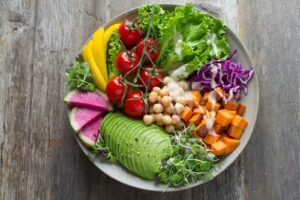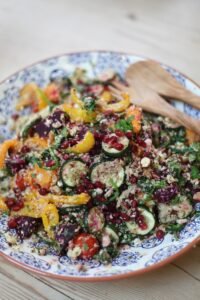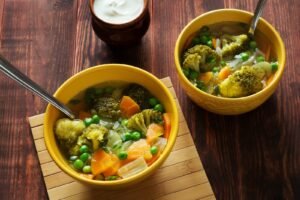The Art of Vegan Cooking: Delicious and Nutritious Plant-Based Recipes
Vegan cooking has gained immense popularity in recent years, as more people embrace the benefits of a plant-based diet. It is a culinary art that not only focuses on creating delicious meals without the use of animal products but also promotes health and sustainability. Whether you are a dedicated vegan or simply looking to incorporate more plant-based meals into your diet, the art of vegan cooking offers a world of exciting flavors and endless possibilities.

Benefits of Plant-Based Diet
Adopting a plant-based diet comes with a range of health benefits. Research has shown that vegan diets tend to be lower in saturated fat and cholesterol, which can help reduce the risk of heart disease and improve overall cardiovascular health. Additionally, plant-based diets are rich in fiber, vitamins, and minerals, which can support a healthy digestive system and boost your immune system. Furthermore, many people find that a vegan diet can lead to weight loss and increased energy levels, making it a popular choice for those looking to improve their overall well-being.
Essential Ingredients for Vegan Cooking
To create delicious vegan dishes, it is important to have a well-stocked pantry filled with essential ingredients. Some staples of vegan cooking include whole grains such as quinoa and brown rice, legumes like lentils and chickpeas, a variety of fresh fruits and vegetables, nuts and seeds, and plant-based milk alternatives like almond or soy milk. These ingredients form the base for a wide range of recipes and provide the necessary nutrients and flavors to make each dish satisfying and nutritious.
Tools and Equipment for Vegan Cooking
Having the right tools and equipment can make a significant difference in your vegan cooking experience. A good quality blender is essential for creating smooth and creamy sauces, soups, and desserts. A food processor can be used for chopping vegetables, making nut butters, or creating homemade vegan cheese. A sharp chef’s knife, cutting board, and a set of reliable pots and pans are also must-haves. Additionally, investing in a spiralizer or a mandolin slicer can add fun and variety to your vegan cooking repertoire.

Vegan Substitutes for Animal Products
One of the most exciting aspects of vegan cooking is discovering the multitude of delicious substitutes for animal products. Tofu, tempeh, and seitan are popular protein alternatives that can be used in a variety of dishes, from stir-fries to sandwiches. Nutritional yeast is a great substitute for cheese, providing a cheesy flavor without any animal products. Cashews, when soaked and blended, can create a luscious cream that can be used in place of heavy cream or dairy-based sauces. With a little creativity and experimentation, you can find vegan substitutes for almost any animal product, allowing you to recreate your favorite dishes in a plant-based way.
Exploring Different Cuisines in Vegan Cooking
Vegan cooking opens up a world of possibilities when it comes to exploring different cuisines. From Mediterranean-inspired dishes bursting with fresh herbs and spices to Asian stir-fries and curries packed with flavor, there is no shortage of options. Mexican cuisine offers delicious plant-based dishes such as veggie fajitas and black bean enchiladas. Indian cuisine is also a vegan-friendly treasure trove, with dishes like chana masala and vegetable biryani that are both flavorful and nutritious. By exploring different cuisines, you can expand your culinary horizons and discover new and exciting recipes to enjoy.
Easy Vegan Breakfast Recipes
Starting your day off with a nutritious and delicious vegan breakfast sets the tone for the rest of the day. Overnight oats, made by combining rolled oats with plant-based milk and toppings like fruits and nuts, are a popular choice. Smoothie bowls, loaded with frozen fruits, plant-based yogurt, and a variety of toppings, are not only visually appealing but also packed with vitamins and minerals. Avocado toast, topped with sliced avocado and a sprinkle of sea salt, is a simple yet satisfying option. Pancakes, waffles, and tofu scramble are also easy to veganize and can be enjoyed on lazy weekend mornings.

Healthy Vegan Lunch Ideas
When it comes to vegan lunches, there are countless options to choose from. Salads are a versatile and nutritious choice, with endless combinations of veggies, grains, and legumes. Buddha bowls, consisting of a variety of cooked and raw ingredients arranged in a bowl, are not only visually appealing but also offer a balanced meal packed with nutrients. Wraps and sandwiches filled with plant-based proteins like tofu, tempeh, or chickpea salad are convenient options for on-the-go lunches. Soups and stews made with hearty vegetables and legumes provide warmth and nourishment during colder months.
Creative Vegan Dinner Recipes
Vegan dinners can be both creative and satisfying, offering a wide range of flavors and textures. Pasta dishes, such as creamy cashew Alfredo or tomato and vegetable marinara, are crowd-pleasers. Stir-fries and curries made with an assortment of vegetables, tofu, and aromatic spices are quick and easy options. Stuffed bell peppers or mushrooms filled with grains, beans, and vegetables make for an impressive and delicious dinner. Vegan pizzas, loaded with plant-based cheese and a variety of toppings, are a favorite among both vegans and non-vegans alike.
Delicious Vegan Desserts and Treats
Vegan desserts and treats are proof that you don’t need animal products to indulge in something sweet and decadent. Banana Nice Cream, made by blending frozen bananas until creamy, is a guilt-free alternative to traditional ice cream. Vegan brownies, cookies, and cakes made with ingredients like coconut oil, applesauce, and flaxseeds are just as delicious as their non-vegan counterparts. Raw vegan cheesecakes, made with a blend of nuts and dates for the crust and a creamy cashew-based filling, are a popular choice for those looking for a healthier dessert option.

Vegan Snacks for Any Occasion
Having a variety of vegan snacks on hand is essential for those moments when hunger strikes between meals. Fresh fruit, such as apples, bananas, and grapes, provides a quick and nutritious snack. Roasted chickpeas or edamame make for a crunchy and protein-packed snack. Veggie sticks with hummus or guacamole are a satisfying and healthy option. Energy balls made from a blend of nuts, dates, and seeds provide a quick boost of energy. Whether you are at home, work, or on the go, there are plenty of vegan snack options to choose from.
Tips for Successful Vegan Meal Planning
Meal planning is an essential aspect of vegan cooking, ensuring that you have a variety of nutritious meals throughout the week. Start by creating a weekly meal plan, taking into consideration your schedule and dietary preferences. Make a shopping list based on the ingredients needed for your meals to avoid any last-minute grocery store runs. Dedicate a few hours each week to meal prep, such as washing and chopping vegetables, cooking grains and legumes, and prepping sauces or dressings. Having pre-prepared ingredients on hand will make it easier to whip up meals throughout the week. Finally, don’t be afraid to experiment and try new recipes to keep your vegan meals exciting and enjoyable.
The art of vegan cooking is a creative and rewarding journey that allows you to explore a world of plant-based flavors and nourishment. By incorporating these delicious and nutritious plant-based recipes into your daily life, you can enjoy the numerous benefits of a vegan diet while delighting your taste buds. So, grab your apron, stock up on essential ingredients, and embark on the adventure of vegan cooking. Your taste buds, health, and the planet will thank you.

Understanding Vegan and Vegetarian Diets
Vegan and vegetarian diets have gained considerable popularity in recent years due to their perceived health and environmental benefits. While they share some similarities, there are distinct differences between the two. Veganism involves abstaining from all animal products, including meat, dairy, eggs, and even honey. On the other hand, vegetarianism typically allows for the consumption of dairy and sometimes eggs while excluding meat. Understanding the nutritional differences, protein sources, essential nutrients, environmental impact, health benefits, ethical considerations, sustainability factors, meal planning, accessibility, and debunking common myths can help individuals make informed decisions about which diet is right for them.
Nutritional Differences: Examining Key Distinctions
One of the primary nutritional differences between vegan and vegetarian diets lies in the consumption of animal products. Animal products are rich in nutrients such as vitamin B12, which is mainly found in meat, fish, and dairy products. Vegans need to rely on fortified foods or supplements to meet their vitamin B12 requirements. Additionally, vegetarians may have a more straightforward time obtaining certain nutrients, like calcium and omega-3 fatty acids, from dairy and eggs, while vegans must seek alternative sources. However, both diets can provide adequate nutrition if well-planned and balanced.

Protein Sources: Comparing Vegan and Vegetarian Options
Protein is an essential component of any diet, and while animal products are commonly associated with protein, both vegan and vegetarian diets offer numerous plant-based protein sources. Vegetarians have a wider range of options since they can consume dairy and eggs, which are excellent sources of protein. However, vegans can obtain sufficient protein from foods such as lentils, chickpeas, tofu, tempeh, quinoa, and a variety of nuts and seeds. It is crucial for vegans to ensure they consume a variety of plant-based protein sources to meet their protein needs adequately. Overall, with proper planning, both diets can provide adequate protein intake.
Essential Nutrients: Evaluating Adequacy in Both Diets
While vegan and vegetarian diets can provide a wide range of essential nutrients, there are some nutrients that require special attention. Vitamin B12, commonly found in animal products, is one nutrient that vegans need to pay particular attention to, as it is crucial for nerve function and red blood cell production. Vegans can obtain vitamin B12 from fortified foods like plant-based milk, breakfast cereals, and nutritional yeast, or from supplements. Both diets must also ensure sufficient intake of iron, zinc, calcium, omega-3 fatty acids, and vitamin D. Planning meals carefully and considering fortified foods or supplements can help ensure the adequacy of these essential nutrients in both vegan and vegetarian diets.
Choosing the Right Diet for You
When comparing vegan and vegetarian diets, it is essential to consider personal preferences, nutritional needs, and ethical considerations. While veganism may be more challenging to follow due to the strict exclusion of all animal products, it offers significant environmental and ethical benefits. Vegetarianism provides a more flexible approach, allowing for the inclusion of dairy and eggs, which can make it easier to meet certain nutritional needs. Ultimately, the choice between the two diets comes down to an individual’s values and beliefs, as well as their ability to plan and meet their nutritional requirements. Consulting with a healthcare professional or registered dietitian can also provide valuable guidance in making an informed decision about the most suitable diet for one’s lifestyle and health.
